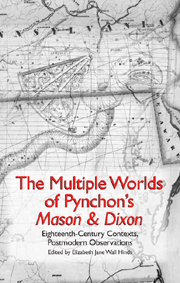 The Multiple Worlds of Pynchon's 'Mason and Dixon'
The Multiple Worlds of Pynchon's 'Mason and Dixon' from Consumption Then and Now
Published online by Cambridge University Press: 12 September 2012
NOWHERE IS THE COMPLEX NARRATIVE engagement with the position of the modern ethical subject in relation to the global commodity culture more profoundly drawn than in the works of Thomas Pynchon, and Mason & Dixon in particular stands as a narrative summa of his career-long interest in the historical dimensions of that position. This is not because the novel is more immediately concerned with the operations of a social ethic within the narrow dimensions of its plot and narrative (in fact, it is probably less concerned with such operations on that level than Gravity's Rainbow or Vineland), but because the problems of Pynchon's lifelong interest in the place of the radical, the humanitarian, the outsider, is here forced to contend with an emergent global market that will provide the fundamental base from which a wide array of colonial endeavors will be launched: the expansion of international trade, the entrenchment of chattel slavery as its privileged mode of production, and the often paradoxical relations of such a system to Enlightenment notions of reason, dignity, and freedom. It is with a sensibility grounded more in the appraisal of dramatic and literary conventions than in the demands of a historically meaningful social activism that many critics have approached the issue of how Pynchon seems to confront despicable historical institutions like slavery; the present analysis, then, endeavors to serve as a preliminary corrective to our critical tendency to sentimentalize Pynchon while glossing over his more deeply embedded conceptions of what constitutes moral sensibility, meaningful action, and agency in general in Mason and Dixon's era of expanding capital and our own.
To save this book to your Kindle, first ensure [email protected] is added to your Approved Personal Document E-mail List under your Personal Document Settings on the Manage Your Content and Devices page of your Amazon account. Then enter the ‘name’ part of your Kindle email address below. Find out more about saving to your Kindle.
Note you can select to save to either the @free.kindle.com or @kindle.com variations. ‘@free.kindle.com’ emails are free but can only be saved to your device when it is connected to wi-fi. ‘@kindle.com’ emails can be delivered even when you are not connected to wi-fi, but note that service fees apply.
Find out more about the Kindle Personal Document Service.
To save content items to your account, please confirm that you agree to abide by our usage policies. If this is the first time you use this feature, you will be asked to authorise Cambridge Core to connect with your account. Find out more about saving content to Dropbox.
To save content items to your account, please confirm that you agree to abide by our usage policies. If this is the first time you use this feature, you will be asked to authorise Cambridge Core to connect with your account. Find out more about saving content to Google Drive.